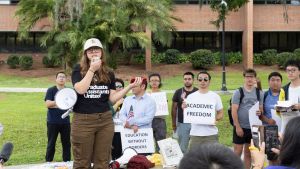
Justice Restored under Xi Jinping: A Political Project
On 5 August 1994, a woman named Kang was found raped and murdered in a cornfield in a western suburb of Shijiazhuang, the capital of Hebei province. A few days later, the Shijiazhuang police established a special taskforce to investigate the case and, based on clues offered by local residents, identified one key suspect: a man named Nie Shubin. In early 1995, Nie was sentenced to death and executed. Back then nobody paid particular attention to the fate of this young alleged criminal. It was only ten years later when another man, Wang Shujin, confessed to that same crime that this case came to light. Following Wang’s confession and suspecting that Nie Shubin had been wrongly executed, Ma Yunlong, then a journalist for the Henan Shangbao, published a short article on the case. Convinced by Wang’s confession and insistent on Nie’s innocence, he sent his report to more than two hundred newspapers around China. Ma was particularly sympathetic to the relentless suffering of Nie’s mother, and he recommended that she employ two lawyers who could help her work on the case. With the aim of seeing justice done, he himself started his own personal investigation into the case—an investigation destined to last for several years and that contributed to his forced early retirement. While the Hebei Court had relied on the alleged confession of Nie Shubin to sentence him to death, it could not equally use Wang Shujin’s confession about his guilt to incriminate him. That would have been too politically costly: it would have meant admitting that the police, procuratorate, judges, and the political-legal committee (zhengfawei) in Shijiazhuang and Hebei province had got it wrong in the first place. Too many people had been involved in Nie’s execution in 1995, and too many interests would have been negatively affected by reversing the verdict and declaring his innocence. Notwithstanding the continued petitioning of Nie’s mother, and the work of numerous lawyers and journalists, the Hebei justice authorities maintained an unnerving silence on the case for almost six years.
In 2013, Wang’s case was adjudicated for the second and third time but, once again, notwithstanding his insistence of his own guilt, the court did not sentence him for Ms Kang’s rape and murder. In 2014, the Supreme People’s Court (SPC) ordered the Shandong High Court to review Nie’s case and a public hearing was held in April 2015. The term for the review was extended four times until June 2016 when the SPC finally decided to retry the case. Only then was the time politically ripe for justice to be done. Just a few months before, Zhang Yue—the then secretary of the political-legal committee of Hebei province—had been caught up in Xi Jinping’s purge against corruption and put under investigation. At last, in December 2016, after a retrial, the SPC declared Nie Shubin’s innocent and awarded his family a substantial compensation (Forsythe 2016).
Spanning over two decades, this case fully exposes the influence of politics—both high-politics and institutional politics—on the administration of justice in China. It clearly shows the change in approaches toward criminal justice that have played out during the Jiang Zemin, Hu Jintao, and Xi Jinping eras. Back in the mid-1990s, when Nie Shubin was tried and sentenced, the imperative was to get criminal cases solved swiftly and criminals punished harshly. During this period, leaders perceived this approach as ensuring the maintenance of social order at a time when economic liberalisation had brought a steady increase in criminal activities and the emergence of new forms of crime unheard of just a decade earlier. In 2013, when the case was reopened, Xi’s priorities were utterly different. He wanted the justice system to be accountable and transparent, working under the rubric of ‘ruling the country in accordance with the law’ (yifa zhiguo). Having Xi himself engaged in a personal battle against miscarriages of justice, cases of wrongful convictions could no longer be tolerated (Wang 2014).
The Need for Change
Nie Shubin’s wrongful conviction was just one of many miscarriages of justice that have been remedied since Xi’s ascendance to power. 2013 was a particularly distressing year in this respect. There was first the case of the ‘Two Zhangs’—Zhang Hui and his uncle Zhang Gaoping—who were declared innocent after having been sentenced to the death penalty and imprisonment, respectively, on charges of rape and murder in 2004 (Zhou 2013). Then, there was the case of Li Hualiang, a Henan man who was wrongly kept in prison for more than twelve years for the rape and murder of a teenage girl (Lu 2013). This was followed by the case of five men who had unjustly spent eighteen years in jail, accused of the robbery and homicide of a taxi driver (Zhu 2017). Later in the year, another man in Anhui—Yu Yingsheng—was declared innocent after serving many years of a life sentence for killing his wife (Jia 2014). The same month, Nian Bin, convicted of fatally poisoning two children in Fujian province, was declared not guilty and freed from death row (Ma 2014).
From 2014 to 2017, courts around China have cleared another nine cases of wrongful conviction and the majority of them have made big news in the Chinese media. Xi has addressed the issue on several occasions, and the political-legal committee, the SPC, along with the other justice institutions, have become heavily involved in identifying the causes behind such unfortunate events. In this general atmosphere of relative openness and political goodwill, Chinese netizens have been allowed to express their anger, journalists to report sad stories of scarred individuals, and legal scholars to discuss in open forums issues of torture and abuses of powers.
These cases of miscarriages of justice—some cleared because the real culprit had confessed to the crime, others on the basis of the legal principle of reasonable doubt and the lack of sufficient evidence—highlights the fact that in the recent past there has been something seriously wrong with China’s justice system. They prove unequivocally that the system of collecting evidence has still been based on archaic methods of torture aimed at obtaining confessions from criminal suspects through any means necessary; that the police have played an inordinately large role securing convictions in comparison to the other judicial organs; that lawyers have had only a minimal, if any, voice in the process of defending the accused; and that cases were too often decided behind closed doors by the intervention of the all-too powerful political-legal committees. A case like that of Nie Shubin’s proved that the interests of the police, the procuratorate, and the political-legal committee, were aligned and needed to be protected at all costs, and that courts were powerless in the event of inconvenient truths emerging. Thus, these cases have also indicated that all too often trials have been a mere formality, intended to corroborate what the police and the procuratorate had already established beforehand—leaving judges relatively powerless to play their rightful roles in the justice system.
Xi’s Remedial Justice
With Xi’s coming to power, it seemed that the time for change had come. The Xi era opened with a new emphasis on procedural justice and building accountability. Reflecting on the weaknesses of China’s justice system that cases of wrongful convictions had brought to light, the Chinese leadership under Xi has sought to foster stronger oversight of political and judicial authorities at the local level in order to enhance transparency. Political rhetoric on the promotion of the rule of law accompanied important announcements of reforms during the Third and Fourth Party Plenums in 2013 and 2014, and the issuance of a number of legislative documents aimed at preventing the occurrence of miscarriages of justice (Trevaskes and Nesossi 2015).
One of the key reforms put forward under Xi has placed the trial at the centre of criminal proceedings (yi shenpan wei zhongxin) (Biddulph et al. 2017). One of the objectives of this new trial-centred doctrine is to counter the traditional tendency of the Chinese police to rely solely or primarily on confession, rather than other kinds of evidence that are more difficult and time-consuming to obtain. The new approach aims at shifting the focus from police testimony and evidence to the revelations of facts at the trial, with the objective of improving the quality of evidence gathering and reinforcing the supervisory role of the prosecution in ensuring that the police do not abuse their power. Differently from the past, court hearings should become decisive in determining the facts of a case, and evidence provided by the police and the procuratorate should be thoroughly tested in court.
The Political Logic
While on the surface these reforms could be considered groundbreaking, they have not found much international admiration and praise. This is perhaps because they are, paradoxically, being carried out at the same time as the expansion of legally dubious tactics employed to suppress any form of dissent, and to ferociously crack down on human rights lawyers and other civil society representatives. At the very beginning of the Xi era, many China observers anticipated that a renewed emphasis on yifa zhiguo and an official commitment to the prevention of miscarriages of justice might cause an overhaul of past abusive practices in the justice system. Since that time, though, the logic behind Xi’s governance platforms has unfolded gradually to reveal its political utility.
It is now clear that the intent behind Xi’s yifa zhiguo is to strengthen Party leadership through the use of the law, in order to further merge Party and state. Reforms of the justice system spurred by cases of injustice have been designed to persuade an increasingly sceptical Chinese population and international audience about the government’s good will. Miscarriages of justice have been used strategically to help Xi’s leadership distance itself from Hu Jintao’s agenda of ‘stability maintenance’ (weiwen) and harmonious society (hexie shehui). They have aided him to escape the fallout of the scandal that engulfed Zhou Yongkang, who, as Minister of Public Security and Secretary of the Central Political and Legal Committee under Hu Jintao, had approved and supported some of the abusive practices that had led to egregious errors of justice. In this spirit, miscarriages have been useful to tell a credible story about how the current leadership is doing things differently—perpetuating the myth that the Party can be held accountable by the Chinese citizens and, as such, can be trusted.
Legal reforms prompted by wrongful convictions are also intended to increase the efficiency of the criminal justice system, to curb corrupt practices, and restore the lost legitimacy of the Party-state. By claiming to solve the problem of miscarriages of justice, Xi can legitimise his political authority—indeed, in his view justice can be achieved only if coordinated by the centre of political power. However, contradictory agendas promoted under the broad umbrella of yifa zhiguo have made it clear that Xi’s aim has not been that of increasing accountability at the expense of coercion, but of intensifying both for the sake of political utility. Rather than shifting its objectives towards fair trial guarantees to help ensure the accountability of the justice system, the Party remains fixated on its coercive power. Thus, when the current administration claims to be willing to deal with past judicial errors in order to prevent them from occurring in the future, they are not doing so merely to increase the accountability of the political-legal system. Their paramount concern is to ensure the preservation of the political status quo and Party’s legitimacy. Overall, this means that miscarriages of justice will continue to be remedied selectively to serve a certain political agenda. Only those who are useful for the larger project of legal and political reforms aimed at creating a more ‘just’ system, so defined by those in power, will have their innocence publicly recognised.





